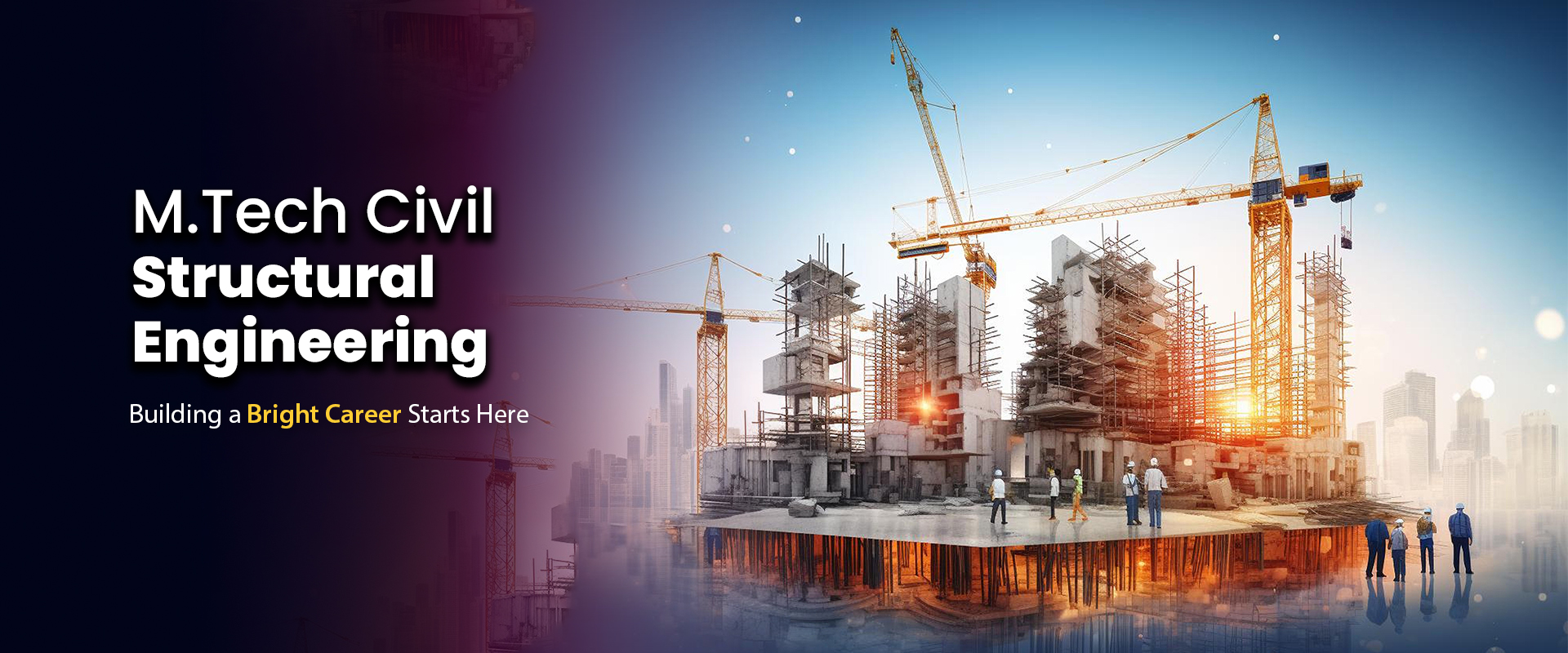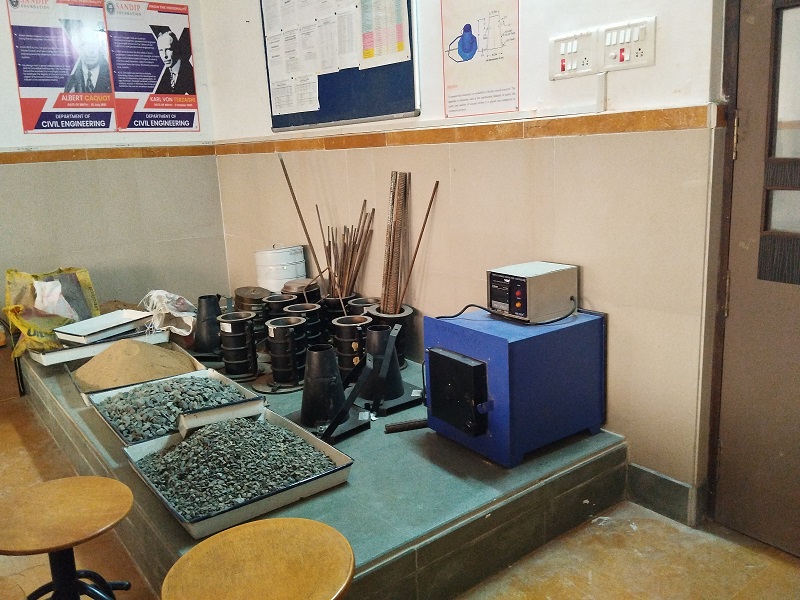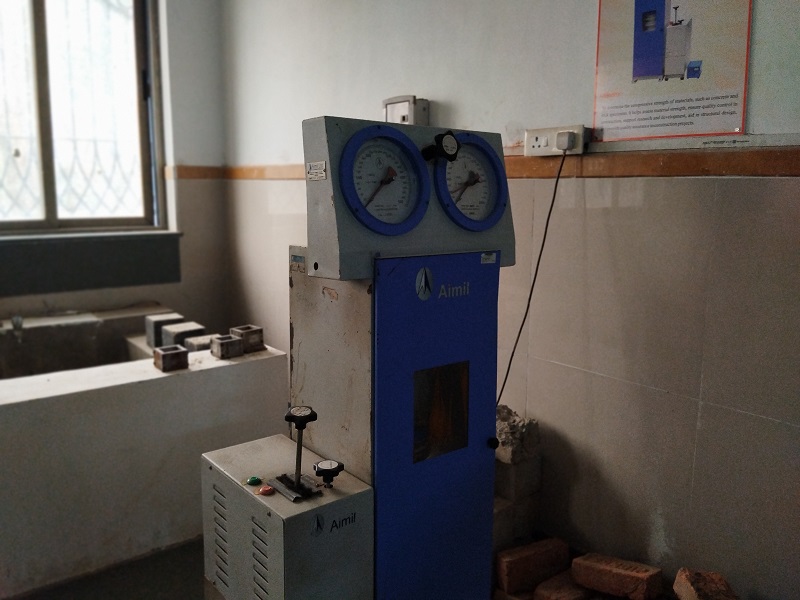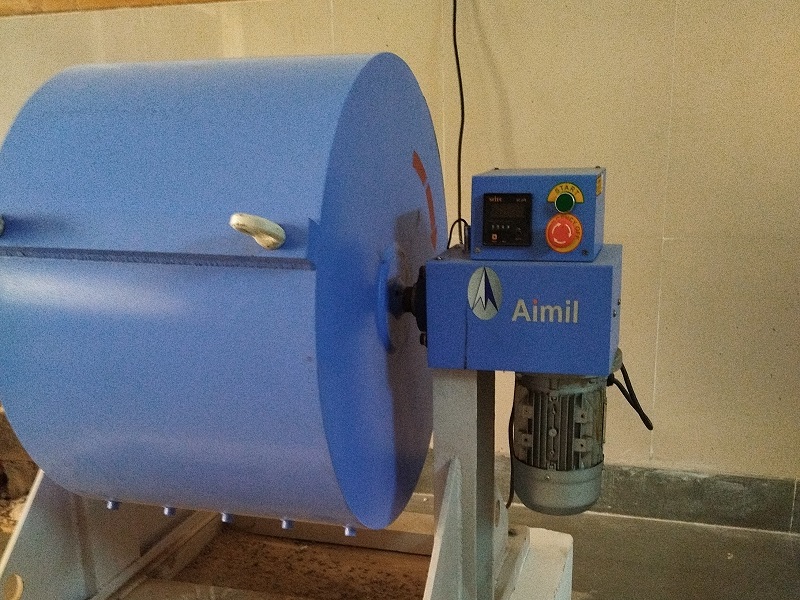
Apply Now
About M.Tech Structural Engineering
Salient Features
Infrastructural Facilities
- World class infrastructure in a 100+ acre campus
- High-tech curriculum aligned with the UGC and AICTE-CBC
- Qualified and highly trained faculty
- Classrooms are equipped with audio-visual aids for enhanced training
- Well-stocked library with latest physical and digital reading material
- Training in software like PSCAD, MATLAB, PLC & SCADA, and ETAP
- Modern and secure hostel facilities
International Networks
- Various MoUs signed with international educational and industry leaders
- Engaging in student and faculty exchange programs for skill development
- Organising co-curricular and extracurricular activities for student enhancement
- Opening doors for international internships and placement opportunities
- Facilitating joint research programs and dual degree programs
Innovative and Creative Curriculum
- Curriculum designed and upgraded as per consultation with industry experts
- Focused lab-work for practical knowledge and skill building
- Focus on research-based learning at the postgraduate level
- Curriculum integrated with value addition and global certifications
Vision
- To establish an outstanding Centre of regional and national reputation for providing a quality based education to the Civil Engineering students.
Mission
- M1:To serve students by providing a broad and high quality education for a successful professional career.
- M2:To conduct strong basic and applied research for national needs.
- M3:To serve the construction industry; civil engineering profession and rural community through dissemination of knowledge and technical services.
Program Educational Objective (PEOs)
| PEO1 | : To train the students so that they can work and contribute to the infrastructure development projects being undertaken by government, private or any other sector companies. |
| PEO2 | To train students in such as a way that they can pursue higher studies so that they can contribute to the teaching profession/ research and development of civil engineering and other allied fields. |
| PEO3 | To train students in a manner that they should function effectively in the multicultural and multidisciplinary groups for the sustainable development and growth of civil engineering projects and profession. |
Programme Outcome (POs)
| PO1 | Engineering knowledge: Apply the knowledge of mathematics, science, engineering fundamentals, and an engineering specialization to the solution of complex engineering problems. |
| PO2 | Problem analysis: Identify, formulate, review research literature, and analyze complex engineering problems reaching substantiated conclusions using first principles of mathematics, natural sciences, and engineering sciences. |
| PO3 | Design/development of solutions: Design solutions for complex engineering problems and design system components or processes that meet the specified needs with appropriate consideration for the public health and safety, and the cultural, societal, and environmental considerations. |
| PO4 | Conduct investigations of complex problems: Use research-based knowledge and research methods including design of experiments, analysis and interpretation of data, and synthesis of the information to provide valid conclusions. |
| PO5 | Modern tool usage: Create, select, and apply appropriate techniques, resources, and modern engineering and IT tools including prediction and modeling to complex engineering activities with an understanding of the limitations. |
| PO6 | The engineer and society: Apply reasoning informed by the contextual knowledge to assess societal, health, safety, legal and cultural issues and the consequent responsibilities relevant to the professional engineering practice. |
| PO7 | Environment and sustainability: Understand the impact of the professional engineering solutions in societal and environmental contexts, and demonstrate the knowledge of, and need for sustainable development. |
| PO8 | Ethics: Apply ethical principles and commit to professional ethics and responsibilities and norms of the engineering practice. |
| PO9 | Individual and team work: Function effectively as an individual, and as a member or leader in diverse teams, and in multidisciplinary settings. |
| PO10 | Communication: Communicate effectively on complex engineering activities with the engineering community and with society at large, such as, being able to comprehend and write effective reports and design documentation, make effective presentations, and give and receive clear instructions. |
| PO11 | Project management and finance: Demonstrate knowledge and understanding of the engineering and management principles and apply these to one’s own work, as a member and leader in a team, to manage projects and in multidisciplinary environments. |
| PO12 | Life-long learning: Recognize the need for, and have the preparation and ability to engage in independent and life-long learning in the broadest context of technological change. |
Programme Specific Outcome (PSO)
| PSO1 | PSO1. Ability to analyze and design physical systems, components, and process by meeting the constraints such as safety, public health and environment. |
| PSO2 | PSO2. To work professionally in construction, design by using modern engineering tools and solve civil engineering problems. |
Career Opportunities in Structural Engineering

Structural Engineer
Structural engineers are responsible for creating designs for structures that are reliable and safe to use after factoring-in natural and other disasters in the long run.

Design Engineer
A design engineer is tasked with creating feasible, safe, functional, and attractive designs for a particular project, based on the client’s requirement.

Site Engineer
Site engineers are professionals who oversee a construction site to ensure that proper code and regulations are followed, including worker safety.

Construction Engineer
A construction engineer is a professional tasked with overseeing a construction project to ensure that proper technologies and materials are used in construction.
Fee Structure & Eligibility
| Programme | Sem | Year | Mode | Eligibility | Academic Fees Per Year (INR) |
|---|---|---|---|---|---|
| M.Tech Civil (Structural Engineering) | 4 | 2 | Sem | Bachelor’s degree or its equivalent qualification in a relevant field from a UGC-recognised college or institution with minimum 50% aggregate marks in the qualifying examination. | Rs. 62,000/- |
Note:
- Forms and Prospectus: ₹500 /- (One Time)
- Hostel Security Deposit: ₹5000 /- (One Time)
- Hostel Fees: ₹75,000 /- (Per Year)
- Uniform Cost: ₹5,500/- (At the Time of Admission)
- Convocation and Certificate : ₹3,000 /-(Final Year)
- University Caution Money: ₹3,000 /- (Refundable)
- Hostel Rooms Allotment at the discretion of the Hostel Supervisor
- Hostel rooms are with bunk bed only
- Registration fees for Diploma & B.Sc. Agriculture: ₹3500/-
- For all other Courses: ₹2500/-
- If any student wants accomodation in B1 Hostel, they have to pay ₹10,000/- extra per year, allotment based on availability of the Hostel room.














